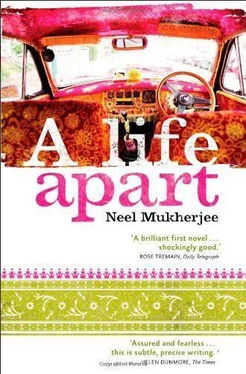This was the poverty that played cat and mouse with Ritwik. It ruled in his world of worn-out clothes, of ill-fitting school shoes that ate into his toes but lasted forever with the help of his father’s home repairs, of the tired vegetables sold at cut price when the greengrocers in the daily market were about to pack up and leave for the suburbs, of the hungry delight with which he waited for the treat of gristly and bony meat once in two months or so. It was everywhere, all the time, so much so that Ritwik either did not remember a time when it was not a daily struggle, or his memory did not match his father’s nostalgic stories of days of plenty.
When he was four, his parents and their two sons had moved from their rented ground floor flat in Park Circus to his uncles’ in Jadavpur. He had never been able to figure out the reason for this. In any case, he was too young to remember except for one somewhat unfocused memory of his mother, in one of her moods, shouting at him while dressing him: You’ll get nothing to eat but salt and rice at your uncles’ house, we’ll see then how fussy you can be about food .
Knowledge is a cumulative business, acquired with the slow, unnoticed accretion of information here and there, and when four-year-old Ritwik arrived at his uncles’ home, he had neither the tools nor the pile-up of evidence to comprehend their instant economically downward move in this act which, for him, was full of fun and excitement. The word for ‘uncles’ house’ in Bengali is, after all, synonymous with boundless liberty and fun. Instead, growing up in Jadavpur became a growing intimacy with the shame of his father’s moving in with his in-laws in their home.
A man with a wife and two children was not allowed to do that sort of thing. Whatever a marriage was for a woman, it certainly wasn’t an invitation on the part of her family to her husband to extend the household. It was decreasing the numbers by giving the daughter away. To leave and then return with a retinue was one of those things which was socially forbidden, almost taboo. And to break that tacit rule was to invite the neighbourhood’s tongues and eyes and ears inside the house and give them free play. Which may well have been the case all those years ago but with an important twist: Ritwik’s father was silently expected to provide for everyone already living in the flat in Grange Road — a disabled grandmother, four unemployed uncles, one marriageable aunt — besides his wife and two sons.
Ritwik’s grandfather had died nearly four years ago, having vehemently opposed the marriage of his daughter to a man thirtythree years older than her. He had apparently relented when Ritwik was born and had gone to see his first grandchild in hospital. With his death, the household in Grange Road had lost its breadwinner. He had left no savings, there was nothing in the way of investments, the flat was a rented one and they had fallen behind with the rents and bills for four years. The electricity had been cut off and one of the first things Ritwik’s father did when they moved in was to have it restored.
Since the death of Ritwik’s grandfather, his grandmother and uncles and aunt had lived from hand to mouth, sometimes on the charity of neighbours and distant relatives, at other times on meagre handouts and soft loans begged from people. Ritwik’s father could not have moved in at a more opportune moment. It was an extended family of ten now, living in a three-bedroom flat, with one tiny kitchen, an equally small bathroom, a balcony fronting the street, and a larger room which was really no room, in the true sense, only an open space on to which all the bedrooms opened.
In some ways, there seemed to have been a barter, as tacit as the social rules his father’s move to his in-laws’ home broke. It was an understanding that this shameful thing would be tolerated if he took on the mantle of the chief (it turned out, only) earner. So to atone for the shaming move here his father took upon himself the more respectable and empowering role of head of family: head of family who earned money on which nine other people lived. It was only much later that Ritwik unravelled the killing illogic of someone trying to undo his own weaker position by accepting to be hobbled with leaching burdens: it was the Third World Debt principle. It was submerged blackmail, pure and simple. His father was sixty-one when all this was set in motion.
The continued unemployment of his uncles was a central source of tension in the family. Pradip, the eldest of the four brothers, did have a short-lived job as a bus conductor in a minibus on the Garia to BBD Bagh route but gave it up when his girlfriend at the time complained that this was not a suitably dignified job. ‘It’s a prestige issue,’ she said, using that incontrovertible argument of the Bengalis.
Ritwik’s childhood was signposted mostly by the frictions between his father, resentful of having four young men in their twenties and thirties living off him, and his uncles, who evaded, dodged and hid from his father and from any sense of adult responsibility. Sometimes this erupted into open confrontations, with his father trying to reason with them, or taunt and humiliate them into some sort of contribution to the running of the household. His uncles swallowed everything in guilty silence, and then slunk away, avoiding another run-in with their brother-in-law by returning home well after midnight. Weeks went by in this careful dance of avoidance, with Dida acting as choreographer, warning her sons off if her son-in-law was at home, or carrying news of the dominant mood to them so they could stay away or time their return home. In their absence, Ritwik’s father took out his frustration on his wife with words carefully chosen for maximal damage.
‘A bunch of illiterate spongers, that’s what your brothers are. Don’t they feel any shame, living off an old man? I’m not paying for them anymore; we’ll have separate kitchens from now on — they can fend for their own food. You can tell them that. Parasites, parasites!’
Silence from his mother.
‘And your parents, both illiterate, they were good for nothing except breeding. Look at this bloody nest of vipers they’ve produced. All they did was litter. They didn’t provide for your education, they did nothing, as if just animal breeding were qualification enough for title of parent. It reminds me of dogs. That’s what your family is, a bloody bunch of strays.’
More silence from his mother. Sometimes quiet tears, or a storming out of the room. Then there were days of noncommunication, slamming of doors, badly cooked food, setting down of plates with a crash and clatter. She took her anger out on her two sons, mostly on Ritwik. As soon as his father left the house, she rounded on him on some pretext or the other.
‘Have you done your homework? Have you? Why are you wasting time then?’ He got a sharp slap across his face, or was dragged by his hair across the room and pushed to the corner where his schoolbooks were piled. ‘Now don’t dare move until you’ve done the lesson. If it’s not ready in an hour, I’ll finish you off, do you understand, finish you off,’ she screamed.
Ritwik, whimpering and scared, pulled out a book, any book, and let his eyes swim over random pages: irrigation in Punjab, how plants made their own food, why we should love and obey God. Nothing sank in; the words were just empty black marks on the page held down by trembling hands.
Whenever his father lashed out against his mother’s family, Ritwik blindly took her side. There was no doubt that all that he said was true but articulating it so cruelly and corrosively made it an unfair stealth-weapon. As a child, he felt anxious and unhappy when his parents quarrelled: at the merest whiff of it — something in the set of his mother’s jaw, or the menace in her heavy tread — his heart began thudding painfully against his ribs. From a very early age, he learnt to sniff out gathering tension in the air, much like old people who can tell changes in the weather by the feeling in their joints. But this was inseparable from the sympathy he felt for her; he must have sensed how difficult it was for her to be in the middle, riven by divided affections and allegiances. She seemed to Ritwik to be a pathetic pawn in this war. When elephants fight, it’s the grass that suffers , Dida used to say. Yes, his mother suffered.
Читать дальше












